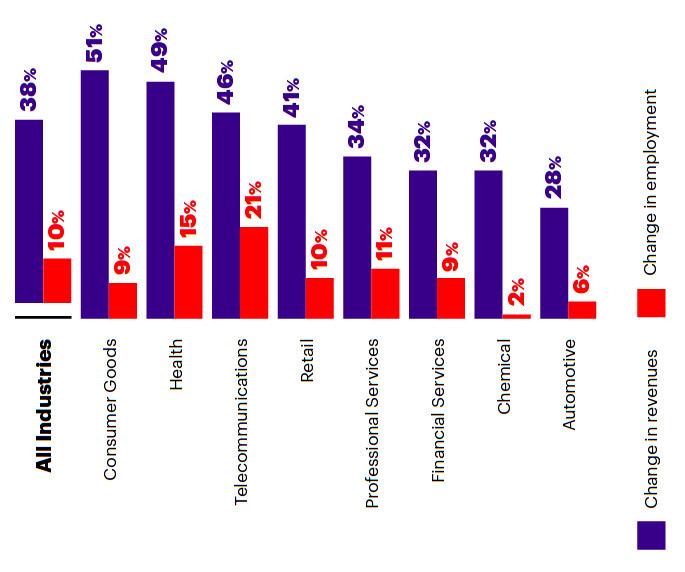Increased engagement in the field of AI could greatly increase both company revenues and employment, says Accenture's strategic report published at the World Economic Forum which is currently taking place in Davos, Switzerland.
The strategic report entitled Reworking the Revolution specifically estimates that if companies invest in AI and human-machine collaboration as much as the best performing ones, they could increase their revenues by as much as 38% by 2022 and increase employment by up to 10%.
Globally, this could mean an increase in profitability by up to $ 4.8 trillion. For an average S&P500 company, it amounts to $ 7.5 billion in revenues and $ 880 million in profits.
Revenue and employment boost by industry in 2018-2022

Source: Accenture Future Workforce Study
The research shows that we have to have strong foundations in order to increase investment in AI skills. Sixty-three per cent of senior executive managers think that their company will create new jobs in the coming years thanks to AI. In addition, most employees (62%) are convinced that AI will have a positive impact on their work.
Accenture recommends the following steps for companies to help them shape the future workforce in the AI era:
- A completely new concept of work which consists of a completely new way of setting work. Evaluate tasks, not job positions, then assign tasks to machines and people, and achieve the balance of automated work and increasing people's skills. Almost half (46%) senior business executives agree that job descriptions are outdated, and 29% say they have already redesigned their jobs.
- Directing the workforce to areas that reveal new forms of values. It's necessary to go beyond the efficiency of processes and to prepare the workforce to create a new customer experience. Promote new growth models by reinvesting savings from automation into the future workforce. Create the conditions for new managerial assumptions that support the thinking, insight and skillfulness that is needed to grasp long-term transformation opportunities.
- Expanding "new skills". There is a need to measure employee skill levels and their willingness to learn to work with AI. Use digital platforms and programs targeted at these different segments of workers, and personalize them to improve the adoption of new skills.
Methodology
The research program included a survey of 14,078 employees of different generations and different skill levels, and a survey of 1,201 managers in senior management positions in different industries. Both of them were held in 11 countries (Australia, Brazil, China, France, Germany, India, Italy, Japan, Spain, the United Kingdom and the United States) from September to November 2017.
The research also included economic modeling in order to determine the correlation between AI investments and financial results, in-depth interviews with 30 people in top positions and interviews with 30 individuals already working with AI.

